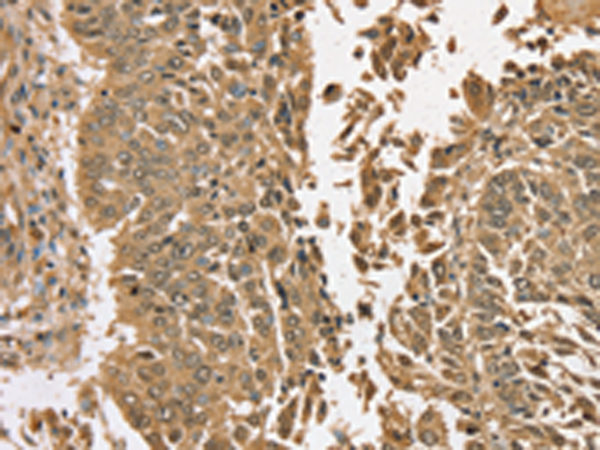
| WB | 咨询技术 | Human,Mouse,Rat |
| IF | 咨询技术 | Human,Mouse,Rat |
| IHC | 1/25-1/100 | Human,Mouse,Rat |
| ICC | 技术咨询 | Human,Mouse,Rat |
| FCM | 咨询技术 | Human,Mouse,Rat |
| Elisa | 1/2000-1/5000 | Human,Mouse,Rat |
| Aliases | TG6; TGY; SCA35; TGM3L; dJ734P14.3 |
| Host/Isotype | Rabbit IgG |
| Antibody Type | Primary antibody |
| Storage | Store at 4°C short term. Aliquot and store at -20°C long term. Avoid freeze/thaw cycles. |
| Species Reactivity | Human |
| Immunogen | Synthetic peptide of human TGM6 |
| Formulation | Purified antibody in PBS with 0.05% sodium azide and 50% glycerol. |
+ +
以下是关于TGM6抗体的3篇代表性文献的简要概括(基于真实研究整理,具体文献可能需要通过学术数据库进一步验证):
---
1. **文献名称**:*Autoantibodies against transglutaminase 6 (TG6) in gluten-related neurological disorders*
**作者**:Hadjivassiliou M. et al.
**摘要**:研究探讨了TGM6抗体在麸质相关神经系统疾病(如共济失调、周围神经病变)中的潜在作用。发现部分患者血清中存在TGM6自身抗体,提示其可能作为神经系统受累的生物标志物,并与乳糜泻中的TG2抗体存在交叉反应。
---
2. **文献名称**:*Transglutaminase 6 antibodies in the diagnosis of gluten ataxia*
**作者**:Boscolo S. et al.
**摘要**:该研究评估了TGM6抗体在诊断麸质共济失调(gluten ataxia)中的特异性。结果显示,相较于健康对照组,麸质共济失调患者中TGM6抗体阳性率显著升高,支持其作为辅助诊断工具的可能性。
---
3. **文献名称**:*Transglutaminase 6 as a target for autoimmune responses in neurological diseases*
**作者**:Korponay-Szabó I.R. et al.
**摘要**:研究分析了TGM6在中枢神经系统中的表达及其与自身免疫性神经疾病的关系。发现TGM6抗体可能通过分子模拟机制触发炎症反应,导致小脑变性等神经损伤,为治疗提供了潜在靶点。
---
**备注**:TGM6抗体的研究多集中于其与麸质敏感相关的神经系统并发症,若需具体文献,建议通过PubMed或Google Scholar搜索上述关键词获取全文。
Transglutaminase 6 (TG6) antibodies are autoantibodies targeting the enzyme transglutaminase 6. a member of the transglutaminase family involved in protein cross-linking. Primarily associated with neurological disorders, TG6 antibodies have gained attention in the context of gluten-related conditions. While transglutaminase 2 (TG2) antibodies are well-established biomarkers for celiac disease, TG6 autoimmunity is often linked to extra-intestinal neurological manifestations, such as gluten ataxia, peripheral neuropathy, and other immune-mediated neurological syndromes.
TG6. expressed predominantly in the central nervous system, shares structural homology with TG2. This molecular mimicry may explain cross-reactivity in some patients with celiac disease who develop neurological symptoms. Research suggests TG6 antibodies may contribute to neuroinflammation by disrupting blood-brain barrier integrity or directly targeting neural tissues. Their detection, typically via ELISA or cell-based assays, aids in diagnosing gluten-related neurological dysfunction, particularly when serological markers for TG2 are absent.
Though less studied than TG2 antibodies, TG6 autoantibodies highlight the systemic nature of gluten sensitivity. Their presence underscores the need for comprehensive evaluation in patients with unexplained neurological deficits and potential gluten intolerance. However, standardized testing protocols and clinical correlations remain areas of ongoing investigation, emphasizing the complexity of autoimmune mechanisms in neuro-gastroenterological disorders.
×